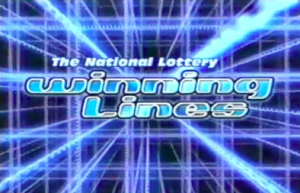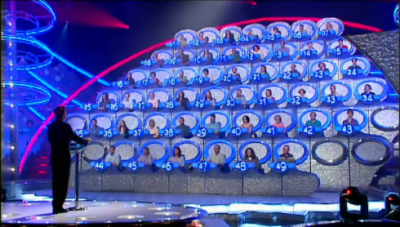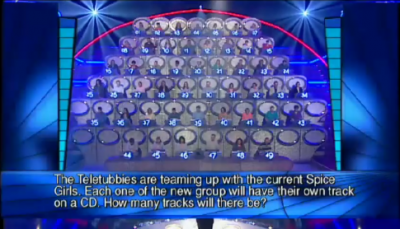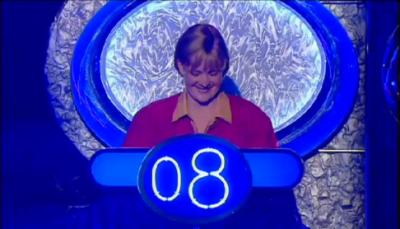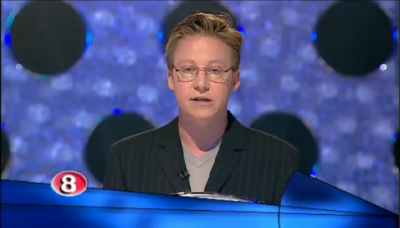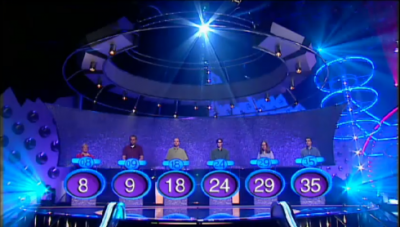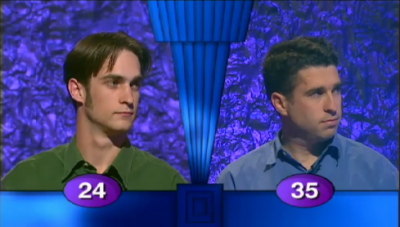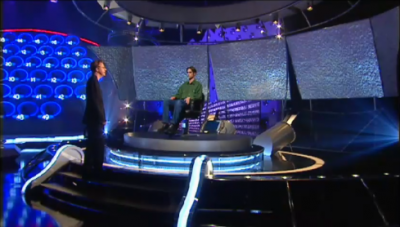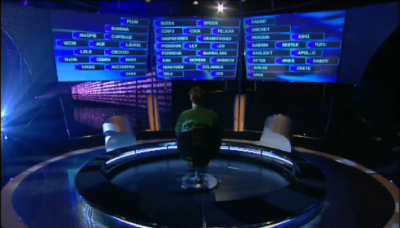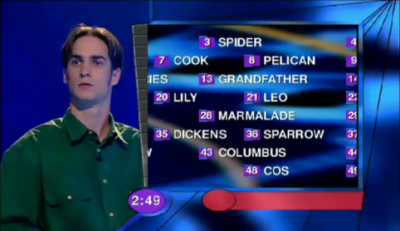Winning Lines
Contents |
Host
Simon Mayo (1999-2000)
Phillip Schofield (2001-4)
Co-hosts
Alan Dedicoat (voiceover)
Broadcast
Celador for BBC One, 13 June 1999 to 16 October 2004 (103 episodes in 6 series)
Synopsis
How funny would it be if Simon Mayo began selling his own brand of nasal spray? It would be Simon Mayo Nasal Spray. You could call it Mayonnaise.
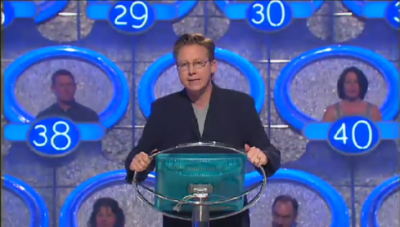 Simon Mayo in front of the 49ers
Simon Mayo in front of the 49ersAnyway, he's decided to sort out the mess that was his hairstyle that confronted us during Scruples and has jumped back into Saturday night television with the best Lottery show since... well... the last one.
Celador should know how to give away money because they make Who Wants to be a Millionaire? for ITV and to that end there are a few similarities. Similarity one is the excellent Industrial Gothic music that's almost permanently in the background.
Celador also made the iffy Talking Telephone Numbers and it shows here because the first round utilizes telephone numbers to decide the contestant for the next week. In the studio are the Forty-niners, 49 contestants who were chosen the last week because their telephone number matched a set of numbers decided that week.
Inside the computer are a load of questions. Simon reads out a question, which are general knowledge but of mathematical nature (Example: You want to buy each of the Bee Gees a set of Darts for their birthday. How many darts would that be?) and everyone has fifteen seconds (ten in later series) to decide whether to answer or not. When the time's up, we see how many have played that question by lighting them pink. If the answer they put in is correct, they go blue and the one with the fastest time goes through to the next round and if they are wrong, they go red and they are out of the game.
In the first series, it was very restrictive because the answers had to correspond to the contestant's number, which are between 1 and 49 and that person has to decide if the answer corresponds to their number, if they buzz in and it doesn't correspond to their number, they are eliminated, if the person that does have their corresponding number to that question and they don't buzz for it, they are eliminated. Therefore they had to "play to stay".
Of the correct answers, the second digit is taken (i.e 45 = 5, 08 = 8) of each of the six winners. If they form your telephone number in any order then you can phone a special number to play in next week's show.
Traditionalists argue that you shouldn't have luck in a quiz show. Perhaps they are right. The first round, rather than being good, is more functional than anything. [Addendum: in series two this was changed so that contestants typed in their numerical answer using a keypad. Ironically, this seemed to make the first round worse, not better, mainly because it took ages. Just goes to show.]
Round Two is 'Looking After Number One'. The rules are very similar to the previous round, with contestants retaining their assigned numbers from the before, but in this game people buzz in to answer a numerical question, the answer to which is either their own number or that of one of the other remaining contestants. If they get it right then they stay in the game, but if they are wrong they are out. Whatsmore if you buzz in, get it right and it's someone else's number then they are out, therefore you have to buzz first and buzz fast.
This bit works rather better than the initial round, especially when the contestants are of the calibre that they buzz in after only a couple of important words in order to stay in and this is heightened further when there are only two people left. Luckily, even if you come second you've done better than the other 49's because you get a holiday somewhere in the country. You also get to start the Thunderball Draw.
Thunderball is the Lottery's third regular draw where five balls and a separate Thunderball are drawn. Sadly, there isn't a huge clap of thunder when the Thunderball comes out, a missed opportunity we think!
The winner of the game goes through to the Wonderwall in order to play for a three week round-the-world holiday. The player sits in a chair and looks at three giant computer screens. On these screens are all 49 answers (with numbers next to them) for the game ahead. Within three minutes they have to answer as many questions as they can. Answering is not enough though because they have to find it on the board and give the number as well.
If they get twenty during the time they win the top prize holiday. Answering fewer questions gets a you a not-as-good holiday. During the 3 minutes, they are given two "pitstops" - periods of fifteen seconds where they can freeze the clock to scan the board. These are invoked by the pressing a trigger button at any time.
The game itself is perhaps better played in the studio than at home as the widescreen answer effect is lost on the small screen. Instead of the three screens in the studio, people at home have a screen that continually scrolls from side-to-side and automatically jumps to the right place when a correct answer is given. Sadly, it doesn't scroll fast enough for our liking so it takes ages to see all the answers.
An excellent touch is that we can see what holiday the player is currently on from getting one question right being a trip to Spaghetti Junction, through to 3 being a Scottish Castle, 12 is Las Vegas and 20 being the Star Prize. It's a shame they don't change the duff prizes more often.
Even more exciting though (!) is that afterwards the winner gets to press the button to start the proper National Lottery Draw.
Would it stand up as its own show without the Lottery? Probably, and it's certainly a huge improvement over the last proper attempt at a Lottery game show, The National Lottery Big Ticket.
So, the moral of the story? Sort your haircut out and life will be sweet.
Postscript
There were a few, fairly minor, changes in later series - Mayo did a runner, but good old Pip "Talking Telephone Numbers" Schofield proved himself a perfectly good replacement, and after a while the winner no longer got to start the draw as the Wonderwall quite rightly moved to the climax of the show. The upshot of all this was that Winning Lines wound up as the longest-running of all the Lottery tie-ins (later overtaken by In It to Win It), simply by being far and away the best. It was quietly dropped after the 2004 series, and we can't really understand why. If we must have a quiz show built around the National Lottery, then better this than the dreadful formats we usually get.
Inventor
The show was invented by David Briggs, Steve Knight, and Mike Whitehill, who also invented Who Wants to be a Millionaire?, as well as this show's predecessor, Talking Telephone Numbers.
Theme music
Keith and Matthew Strachan composed the full score.
Catchphrases
(Before the Wonderwall): The more you get right, the further the flight.
Trivia
Prize destinations
The original list of prize destinations was as follows:
1 - Spaghetti Junction
2 - London
3 - Scottish Castle
4 - Ireland
5 - Amsterdam
6 - Paris
7 - Monte Carlo
8 - Majorca
9 - Italy
10 - New York
11 - Hong Kong
12 - Las Vegas
13 - Mauritius
14 - Caribbean Cruise
15 - Zimbabwe
16 - Texas
17 - Hawaii
18 - Barbados
19 - Australia
20 - Round the World
- For the first three episodes of the first series, Hawaii was the 16-answer prize while Texas was the 17-answer prize. They were both swapped after someone who was compiling the destinations made a technical error as Hawaii was further from the UK than Texas.
- At the start of the second series, a general USA trip replaced Las Vegas as the 12-answer prize and an African Safari replaced Zimbabwe as the 15-answer prize. Florida became the 16-answer prize to replace Texas.
- For the final nine episodes of the third series, airing between 15 September and 24 November 2001, all the American destinations except Hawaii were replaced with non-American destinations, following the terrorist incidents in New York and Washington D.C.: a Mediterranean Cruise became the 10-answer prize, African Beach the 12-answer prize and St Lucia the 16-answer prize.
- The American destinations returned at the start of the fourth series, at which point the 2-answer prize was modified to London Theatre and the 9-answer prize to Italian Lakes.
- Finally, at the start of the fifth series, Dubai replaced Hong Kong as the 11-answer prize, and South Africa replaced the African Safari as the 15-answer prize.
There really was a VT package for when someone answered just one question correctly in the three minutes. The screen text said "A weekend for one in a B&B overlooking Spaghetti Junction", with sounds of vehicle traffic in the background.
Miscellaneous
During the third series, the winner of each edition got to return for the midweek Lottery draw on Wednesday and contest the Wonderwall again for spending money. Each correct answer was worth £200, with twenty correct answers earning a bonus £1,000, to make a total of £5,000. The only sting was that there were no "pitstops", which might explain why the top prize was won only once. The cash Wonderwall was discontinued at the end of the third series, probably on cost grounds.
The Schofield era episodes were given a repeat airing from March 2010 on Challenge. All references to The Lottery Corp were edited out, which wasn't any trouble for the most part. However it was difficult to miss the frequent changes in Schofield's posture and expressions at the start of the programme due to the many edits during his introduction.
Merchandise
Winning Lines Quizbook (paperback)
Winning Lines Quizbook 2 (paperback)
Web links
Andy Walmsley's set design pictures
See also
Videos
The last episode of Series 2.

